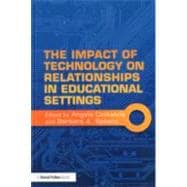
Note: Supplemental materials are not guaranteed with Rental or Used book purchases.
Purchase Benefits
What is included with this book?
| List of illustrations | p. viii |
| Notes on contributors | p. ix |
| Foreword | p. xvii |
| Acknowledgements | p. xix |
| Introduction | p. 1 |
| Positive uses of ICTs: background issues | p. 5 |
| Positive uses of social networking sites: youth voice Perspectives | p. 7 |
| Secure net addresses: secure internet and responsibility | p. 22 |
| Media education: a new academic curriculum | p. 30 |
| Scholarly settings | p. 43 |
| ICT and relationships: promoting positive peer interactions | p. 45 |
| The use of interpersonal communication technologies to establish and maintain peer relationships | p. 55 |
| Prosocial use of the internet in adolescence | p. 66 |
| Using the internet positively in schools: the case for notebooks | p. 77 |
| The digital generation gap revisited: constructive and dysfunctional patterns of social media usage | p. 91 |
| Kids in the fast lane: achieving well-being through online support | p. 102 |
| Online support in psychological and pedagogical practices | p. 116 |
| Online counselling for enhancing relationships | p. 128 |
| Prevention of cyberbullying | p. 137 |
| Peer education intervention: face-to-face versus online | p. 139 |
| Cybermentoring | p. 151 |
| Bullies' and victims' experiences of the anti-bullying game from the KiVa program | p. 158 |
| FearNot!: an innovative interdisciplinary virtual intervention to reduce bullying and victimization | p. 169 |
| Using mobile phones to counter cyberbullying: an innovative project | p. 178 |
| A review of initiatives using technology to promote cyber-safety and digital citizenship | p. 188 |
| Conclusion | p. 204 |
| Index | p. 207 |
| Table of Contents provided by Ingram. All Rights Reserved. |
The New copy of this book will include any supplemental materials advertised. Please check the title of the book to determine if it should include any access cards, study guides, lab manuals, CDs, etc.
The Used, Rental and eBook copies of this book are not guaranteed to include any supplemental materials. Typically, only the book itself is included. This is true even if the title states it includes any access cards, study guides, lab manuals, CDs, etc.